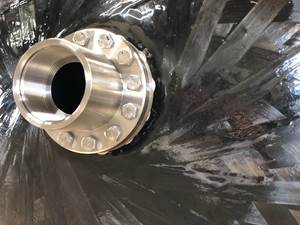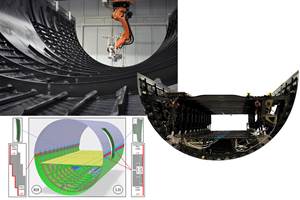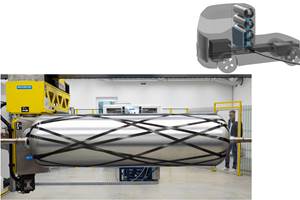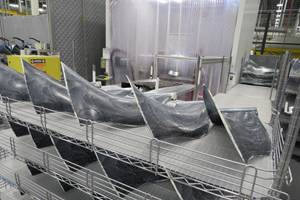ZeroAvia, ZEV Station gear up hydrogen refueling ecosystem at California airports
The two California-based companies have agreed to launch a trial project as powertrain developer ZeroAvia is preparing for first test flights with its Dornier 228 testbed aircraft.
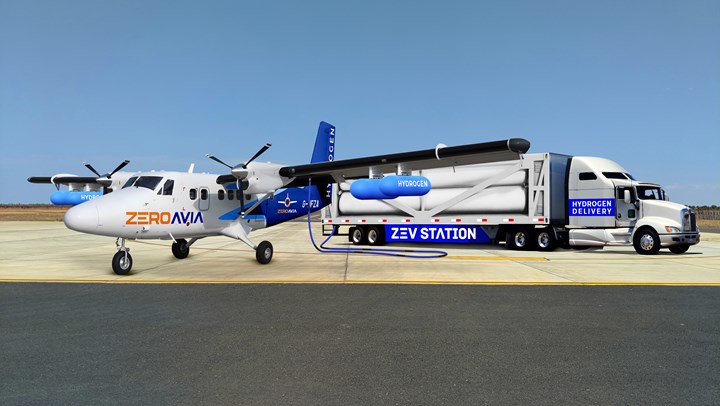
Photo Credit: ZeroAvia, ZED Station
Hydrogen-electric aircraft developer ZeroAvia (Hollister, Calif., U.S.) has recently signed a Memorandum of Understanding (MOU) and announced a new partnership with the hydrogen fueling firm ZEV Station (Palm Springs, Calif., U.S.) to develop green hydrogen refueling infrastructure for airports in California.
The companies will work together on developing an initial regional airport project that represents sufficient scale to showcase how hydrogen-electric propulsion systems can deliver zero-emission commercial flights. ZeroAvia says it will leverage its research and development (R&D) in hydrogen production and refueling for aviation alongside ZEV Station’s experience in the provision of gaseous hydrogen for road vehicles, in order to develop an innovative hydrogen airport refueling system.
As part of the partnership, ZeroAvia plans flight demonstrations of hydrogen-electric aircraft from pilot airports, supported by the co-developed refueling ecosystem and dedicated support from ZEV Station (see “ZeroAvia picks up speed on hydrogen-fueled flight with technology collaborations, planned flights”).
ZeroAvia reports that it has already developed a fully functioning microcosm of potential refueling operations. The Hydrogen Airport Refueling Infrastructure (HARE), developed as part of the HyFlyer projects in conjunction with the European Marine Energy Center (EMEC, Stromness U.K.), has demonstrated green hydrogen production through to airside fueling.
ZeroAvia plans to work with industry partners to build out the refueling ecosystems for hydrogen at airports globally.
“There is enormous potential for airports to act as hydrogen hubs precisely because there will be significant demand — hydrogen-electric propulsion is the only practical, holistic and economically viable solution to the industry’s full climate impacts,” Arnab Chatterjee, VP, infrastructure, ZeroAvia California, notes.
According to ZEV Station, it is engineering a highway zero-carbon fueling station for both fuel cell and electric vehicles (EV) at the same forecourt. The company’s charging-only test site is slated to open at the end of May 2022. Its first “premier” ZEV Station with both charging and hydrogen is under permitting and targeted for operation in early 2023. ZEV Station is in the planning for a network of stations with production of their own hydrogen, delivering to satellite stations.
“We see a unique synergy in our ground vehicle ‘hub & spoke’ hydrogen distribution model and aviation,” Jesse Schneider, CET/CTO, ZEV Station, adds. “For this, we are planning an aircraft fueling demonstration project together with ZeroAvia, also to increase use of a hydrogen delivery trailer. We jointly plan to collaborate to help accelerate fueling methodologies with public-private-partnerships such as the newly formed H2-Aero Team at the Vertical Flight Society.
“As a future step, there is potential to take these learnings towards the creation of zero-emission airports with a large central hydrogen production at scale, an H2-Hub. This H2-Hub, with zero-carbon energy, would generate a significant amount of green hydrogen on site for both aircrafts and vehicles. This could offset the need for carbon-based fuel at airports entirely, but there is a lot to be done to make this a common reality. ZEV Station sees the partnership with ZeroAvia as a key catalyst to help kickstart hydrogen fueling for aviation in California and beyond.”
ZeroAvia plans to work with industry partners to build out the refueling ecosystems for hydrogen at airports globally. Shell (London, U.K.) is both an investor in the business and fueling partner, and ZeroAvia has also partnered with Octopus Hydrogen (London) to help power its current flight testing program in the U.K. ZeroAvia is also working in partnership on an intention to develop what is said to be one of the world’s first commercial zero-emission routes from London to Rotterdam the Hague Airport, in conjunction with Royal Schiphol Group, Rotterdam The Hague Innovation Airport Foundation and the airport itself.
Moreover, in the coming weeks, ZeroAvia will begin flight-testing its hydrogen-electric powertrain using its Dornier-228 testbed aircraft. This work, part of the HyFlyer II project, will deliver a fully certified 600-kilowatt model for aircraft of up to 19 seats for 2024; it is supported by the UK Government’s Department for Business, Energy and Industry Strategy (BEIS), Aerospace Technology Institute (ATI) and Innovate UK through the ATI Programme. The company plans to scale up its technology to 40-80 seat aircraft by 2026, with ground tests of the 1.8-megawatt powerplant prototypes starting this year.
Related Content
Infinite Composites: Type V tanks for space, hydrogen, automotive and more
After a decade of proving its linerless, weight-saving composite tanks with NASA and more than 30 aerospace companies, this CryoSphere pioneer is scaling for growth in commercial space and sustainable transportation on Earth.
Read MoreManufacturing the MFFD thermoplastic composite fuselage
Demonstrator’s upper, lower shells and assembly prove materials and new processes for lighter, cheaper and more sustainable high-rate future aircraft.
Read MoreCryo-compressed hydrogen, the best solution for storage and refueling stations?
Cryomotive’s CRYOGAS solution claims the highest storage density, lowest refueling cost and widest operating range without H2 losses while using one-fifth the carbon fiber required in compressed gas tanks.
Read MorePlant tour: Albany Engineered Composites, Rochester, N.H., U.S.
Efficient, high-quality, well-controlled composites manufacturing at volume is the mantra for this 3D weaving specialist.
Read MoreRead Next
Developing bonded composite repair for ships, offshore units
Bureau Veritas and industry partners issue guidelines and pave the way for certification via StrengthBond Offshore project.
Read MoreVIDEO: High-volume processing for fiberglass components
Cannon Ergos, a company specializing in high-ton presses and equipment for composites fabrication and plastics processing, displayed automotive and industrial components at CAMX 2024.
Read MorePlant tour: Daher Shap’in TechCenter and composites production plant, Saint-Aignan-de-Grandlieu, France
Co-located R&D and production advance OOA thermosets, thermoplastics, welding, recycling and digital technologies for faster processing and certification of lighter, more sustainable composites.
Read More



















